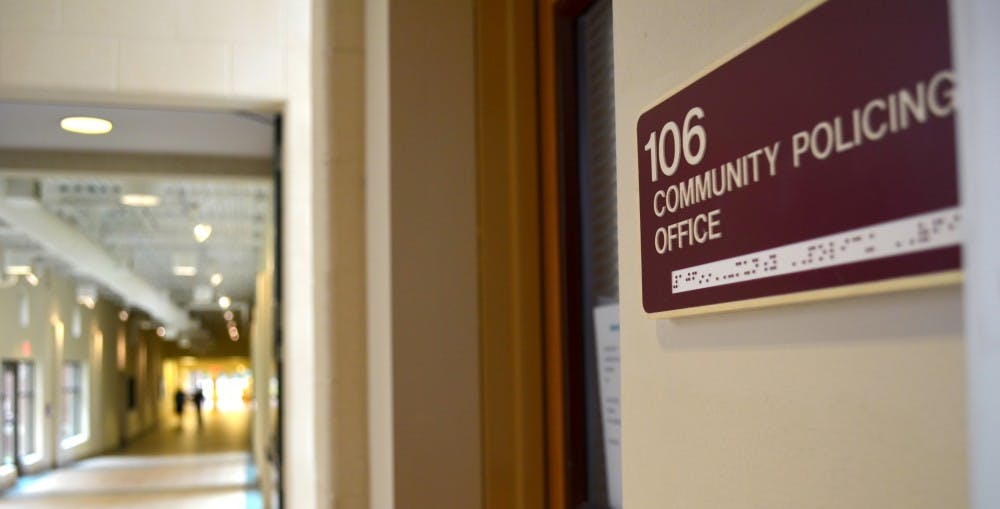Liquor, drug violations increase in residence halls, police work to support sexual assault victims

Central Michigan University Police Department's annual fire and safety report revealed the number of on-campus drug violations has nearly doubled. Liquor violations also have increased by more than 100 in the past year.
There were 125 drug violations referred for disciplinary actions in 2014 compared to only 65 in 2013. The number of actual drug arrests decreased slightly to 36 in 2014 from 43 in 2013. While some cases are handled by the university alone, police occasionally have to get involved.
“The difference between arrests and violations is that violations are things handled by the Office of Student Conduct. A majority of the violations come out of the residence halls,” CMUPD’s Lt. Cameron Wassman said. “In the case of the alcohol violations, for many, we don’t even play a part in. The staff in a residence hall comes across a violation, it’s turned over to the Office of Student Conduct, and we don’t even get involved.”
Drug-related violations weren’t the only notable increase: There were 473 liquor law violations referred for disciplinary action in 2014 compared to 333 violations in 2013.
With the 42 percent increase in liquor violations, liquor arrests also increased to 136 from the reported 112 in 2013.
Director of Student Affairs Shaun Holtgreive said a reason for the increase might be more populated residence halls. A total of 6,151 students live in residence halls this semester, compared to 5,905 during spring 2015. Holtgreive said the enforcement level of campus policies by residence hall staff hasn't changed.
There is no clear answer to why there was such a drastic increase in violations, police said. Alcohol being more available to underage students, compared to controlled substances, may be one cause of the increases, Wassman said.
“I wouldn’t consider any of these numbers a good thing. If I had my choice, I’d rather see there be more alcohol violations than drug violations,” Wassman said. “From a legal standpoint, according to Michigan law, a controlled substance violation is more of a serious offense.”
Unlike a controlled substance violation, police aren't involved in liquor violations unless a student is uncooperative, then the possibility of being issued an minor in possession is raised.
Liquor violations are kept on students' discipline and conduct record, but aren’t connected to their academic transcripts. After seven years of being kept on file, the violation is deleted.
“I see a lot of students worry about that when they’re transferring or planning on going to graduate school,” said Director of the Office of Student Conduct Tom Idema. “Typically a criminal case can follow you for the rest of your life, so when they refer you to us, it’s always a good thing. Sometimes a student just doesn't see it right away, but the officer was cutting you a break.”
For the first alcohol offense, students are fined $200 and are required to take an online alcohol education course. Second-time offenders receive a $300 fine, an online alcohol education course and the student is put on disciplinary probation until graduation. A third offense results in suspension.
Controlled substance offenses include a $300 fine, and require an online controlled substance education course. The student is placed on disciplinary probation until graduation. A second offense results in suspension.
“When students go through the counter process, we typically don’t see a student come through a second or third time," Idema said. "We usually only see them once because they learned their lesson, which is what we want. We want them to follow the community standard and graduate and get their degree. We just don’t want drinks and drugs to get in the way of their dreams and aspirations.”
Sexual misconduct
According to Michigan law, consent for sex cannot be given if a student is asleep, unconscious, or otherwise incapacitated whether due to drugs, alcohol or medication. Any person not completely sober is unable to say “yes” to any sexual act. While there was an increase in on-campus drug and alcohol violations, the number of sexual assaults has remained steady consistent. Officials say the numbers do not accurately represent what is actually going on in the community and on campus.
“The numbers are at an all-time high of how often the instances are occurring, but reporting the crime is very low,” said Sexual Aggression Peer Advocates Director Brooke Oliver-Hempenstall. “What’s actually getting reported to the police is not an accurate representation of those who are being victimized in this way.”
SAPA, CMU's 24-hour crisis hotline for victims of sexual assault, receives hundreds of calls a year compared to the only 10 official reports shown to police.
CMUPD only received 10 reports of rape, nine of which were on-campus. There were also four cases of fondling. Two of the nine on-campus rapes were classified under the state criminal code as fourth-degree criminal sexual conduct, which is a two-year misdemeanor. One case of a student assaulting four other people on-campus was classified as a felony.
A recent survey by the Association of American Universities, which was conducted at Michigan State University and University of Michigan, revealed that 11.7 percent of student respondents across 27 universities reported they experienced a type of sexual assault since enrolling at their university. More than 70 percent of these students didn't report the incident. The fear of the report not being taken seriously was the most common reason for not reporting the incidents.
“There are a lot of rape myths out there that still place the blame on the victim, including that a survivor who had been under the influence was asking for it or should have known better instead of looking at the person who took something away from them without their consent,” Oliver-Hempenstall said. “These are crimes of power and control."
The Office of Student Conduct doesn’t pursue disciplinary actions against a student for the improper use of alcohol or drugs if they make a report of an alleged act of sexual misconduct.
The Jeanne Clery Disclosure of Campus Security Policy and Campus Crime Statistics Act is a federal law that requires all universities to share crime reports in efforts to improve campus safety.
Through the Clery Act, campus workers, including resident assistants, are required to report any sexual misconduct a student mentions. Under Title IX, reporting to the university doesn't require a police investigation.
“Our numbers are higher than those reported because we are completely confidential," Oliver-Hempenstall said.
Idema noticed a trend in students worrying if a person is a confidential resource because they don’t want to have their assault be investigated. He explained that while it’s mandatory for university staff to report a claim of sexual assault,the student always has a say on whether an investigation is pursued.
When a staff member reports a sexual assault to the Office of Civil Rights and Equity, they are soon contacted with resources and requests, which can be declined.
A student could report a sexual assault to any police agency, including the CMU Police Department, Mount Pleasant Police Department, Isabella Sheriff’s Department and the Michigan State Police.
There was one non-campus report of rape. Non-campus reports include any assault that took place within campus boundaries, but not directly on-campus.
Assaults in locations like Main Street or any off-campus apartment wouldn’t be included in the Clery Act because the incident didn't happen on campus or on property controlled by CMU, said CMU Lt. Larry Klaus. These reports are investigated by the Mount Pleasant Police Department. The Clery Act does not require universities to include, or record, these incidents.
Something else not reported is the located of incidents. Police required Central Michigan Life to file a formal Freedom of Information Act request and would not release the information when asked. CM Life is in the process of obtaining this information.
Yale junior Maddi Klause was surprised when she found out that assaults that took place at locations in the city and off-campus housing were not included in the report because of how many students populate these areas.
“It may be off campus, but this off-campus housing is mere feet from campus in some areas,” she said. “CMU wants data accurately reflecting what happens to students, so what happens off campus in an area meant for students should be included.”
Only if an assault happened inside of a fraternity or sorority house would it be included in the Clery Report. Greek houses are considered a non-campus property that is associated with the university.
Without including all sexual assaults that happen to students, whether on or off campus students may not understand how serious of an issue sexual assault is, said Jackson senior Tori Saylor.
“I think it's really important to include the assaults that happen off-campus. Those studies need to produce as accurate of numbers as possible so that we can truly assess the sexual assault problem within our community,” she said.
CMU's updated sexual misconduct policy states that if a student is found in violation of the policy, the minimum sanction they will face is a suspension to the university. The length of the suspension depends on the circumstances of the sexual assault. Factors include varying degrees of assault, as well as age, if a weapon was used, if force was applied or if there was penetration.
“For me, they’re all sexual assaults. They’re all violations of someone’s privacy and they’re all a crime. There’s just a varying degree of the assault,” Klaus said. “When you say rape or fondling, it depends on the survivor. A fondling may impact one survivor the same as an assault that includes penetration. It just depends.”
Law and Order CMU
CMUPD recently developed a special victims cadre with five officers that work specifically with survivors of sexual assault, dating and domestic violence and stalking. The team ensures the investigation is being done thoroughly while also leading the survivor to recovery resources.
Police provide a care team, help with with their professors, and will try to do “whatever will help them become successful,” Lt. Klaus said.
Officers assigned to the team spent five days in New York participating in a sexual assault and dating violence training program. They will continue their training at a two-day training program with the Saginaw Chippewa Tribe in upcoming weeks.
“Now as a police department, we are more focused on helping the survivor,” he said. “It’s our mission to be more sensitive with the interviews and investigation.”



